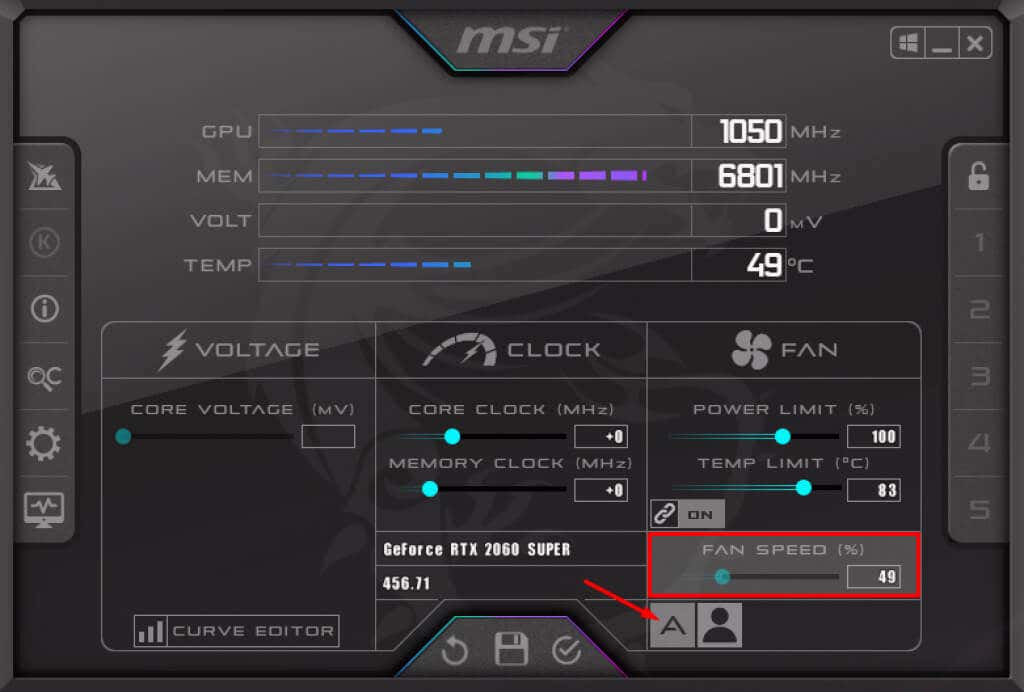Favorite Info About Is 100% Fan Speed Okay

Is Max Fan Speed Really a Problem? Let's Cool Down the Debate
1. Understanding the Hype Around High Fan Speeds
So, you've cranked up your computer's fan to 100%. Maybe you were gaming, maybe rendering a video, or maybe you just live in a sauna. The big question now: are you slowly killing your beloved machine? The short answer is, probably not, but let's dive into the longer, more nuanced answer. After all, simply shouting yes or no isn't really that helpful, is it? Think of this as a conversation between friends, where one friend is panicking and the other one, that's me, attempts to ease the worries.
Running your fan at full blast isn't inherently evil. It's designed to do exactly that when your system's temperatures start climbing. Modern components are built to withstand some heat. It's constant, prolonged overheating that causes problems. However, there's more to consider than just component lifespan.
Think about it this way: you wouldn't sprint a marathon every day, would you? While your body is designed to handle a sprint, doing it constantly will probably lead to some aches, pains, and maybe a trip to the physical therapist. Similarly, running your fan at 100% all the time might have some undesirable side effects, even if it doesn't immediately brick your hardware. We're talking noise, potential for increased dust buildup, and, in rare cases, bearing wear.
Ultimately, it's a balancing act. You want to keep your system cool, but you also want to avoid unnecessary wear and tear. So, let's explore what's really going on when your fan is screaming at full volume.

The Noise Factor
2. Is That a Jet Engine or My Computer?
Let's be honest, the most immediate downside to 100% fan speed is the noise. It can be incredibly distracting, especially if you're trying to focus on work, listen to music, or just enjoy some peace and quiet. Imagine trying to edit a delicate audio track while your computer sounds like it's preparing for takeoff! It's not ideal, to say the least. So, the question becomes, is that slight increase in performance really worth the constant roar?
This is where personal preference comes into play. Some people are incredibly sensitive to noise, while others can happily ignore it. If you fall into the former category, constantly running your fan at maximum might drive you bonkers. Investing in quieter fans or exploring better cooling solutions (like liquid cooling) might be worthwhile.
On the other hand, if you're deep into a game and need every last frame per second, you might be willing to put up with the noise. It's a trade-off, and it's up to you to decide what's more important: silence or performance. Think of it like choosing between a super-fast sports car and a comfortable, quiet sedan. Both get you from point A to point B, but the experience is vastly different.
Ultimately, the "noise factor" isn't just about annoyance; it's about your overall computing experience. A noisy computer can be a constant source of stress, and that's never a good thing. So, listen to your ears (literally!) and find a balance that works for you.

Fan Curve (i7 10700k & Nzxt X53 AIO) Pcmasterrace
Dust Devils and Fan Lifespan
3. More Speed, More Dust? The Unseen Consequences
Okay, so the noise isn't driving you crazy. Great! But there's another potential downside to consider: dust. A fan spinning at 100% is going to pull in a lot more air, and that air inevitably carries dust particles. Over time, this dust can accumulate inside your computer, coating components and hindering their ability to dissipate heat. This, ironically, can lead to higher temperatures and even more aggressive fan speeds.
The problem isn't just the dust itself, but where it accumulates. Think of your heatsink as a radiator in your car. If the fins get clogged with dust, it can't effectively transfer heat. This forces your fan to work even harder to compensate, creating a vicious cycle. Regular cleaning is essential, especially if you're running your fan at high speeds frequently.
Then there's the potential impact on the fan itself. While modern fans are generally quite durable, constantly running them at maximum speed can put extra strain on the bearings. Over time, this can lead to wear and tear, potentially causing the fan to become noisy or even fail. While fan replacement is usually a relatively inexpensive fix, it's still an inconvenience to avoid if possible.
So, while 100% fan speed might not immediately destroy your computer, it can contribute to a slower, dustier, and potentially shorter lifespan for your cooling system. A little preventative maintenance goes a long way!

How To Adjust Fan Speeds On Any Graphics Card In Just 1 Min YouTube
Temperature Monitoring and Control
4. Taking Charge of Your Thermal Situation
The best way to determine if 100% fan speed is "okay" is to understand why your fan is running that fast in the first place. Are your components actually overheating, or is your fan just being overly aggressive? Fortunately, there are plenty of tools available to monitor your system's temperatures in real-time. Software like HWMonitor, Core Temp, and even the built-in monitoring tools in your operating system can provide valuable insights.
Once you know your temperatures, you can start to take control. Many motherboards and graphics cards offer fan control software that allows you to customize fan curves. This means you can set specific fan speeds based on temperature. For example, you might set your fan to run at 50% until your CPU reaches 60C, and then gradually increase the speed as the temperature rises further.
This allows you to find a balance between cooling performance and noise levels. You can prioritize silence during less demanding tasks and ramp up the fan speed only when necessary. It's like having a smart thermostat for your computer. By being proactive and monitoring your temperatures, you can avoid unnecessary fan noise and potentially extend the lifespan of your components.
Don't just blindly accept that your fan needs to run at 100% all the time. Take the time to understand your system's thermal behavior and adjust your fan settings accordingly. You might be surprised at how much quieter and more efficient your computer can be!

Troubleshooting High Fan Speeds
5. Digging Deeper
If your fan is constantly running at 100%, even when your system is idle, that's a sign that something might be wrong. Before you panic, check the basics. Make sure your heatsink is properly seated and that there's adequate thermal paste between it and the CPU or GPU. A loose heatsink can prevent proper heat transfer, causing your components to overheat.
Next, check for any potential software conflicts. Sometimes, buggy drivers or poorly optimized applications can cause your CPU or GPU to run at unnecessarily high speeds, triggering the fans to kick into overdrive. Try updating your drivers or closing any unnecessary programs to see if that makes a difference.
If those steps don't help, it's time to start thinking about more serious issues. It's possible that your CPU or GPU is overheating due to a hardware malfunction. If you're comfortable doing so, you can try reseating your components or even reapplying thermal paste. However, if you're not experienced with computer hardware, it's best to consult a professional.
Finally, consider the age of your system. Over time, components can degrade, and cooling solutions can become less effective. If your computer is several years old, it might be time to upgrade your cooling system or even replace some of the components.

FAQ
6. Quick Answers to Common Concerns
Let's tackle some frequently asked questions to put your mind at ease.
Q: Will running my fan at 100% void my warranty?
A: Probably not. Running your fan at its maximum speed is generally considered normal operation. However, if you physically damage the fan while trying to modify it, that could void the warranty.
Q: Is liquid cooling always better than air cooling?
A: Not always. Liquid cooling can offer superior performance, especially for high-end systems. However, it's also more expensive and requires more maintenance. Air cooling is often sufficient for most users, and it's generally more reliable.
Q: How often should I clean my computer's fans?
A: It depends on your environment. If you live in a dusty area, you might need to clean your fans every few months. If your environment is relatively clean, you can probably get away with cleaning them every six months or even once a year.
Q: My fan is making a weird noise. What should I do?
A: First, check to see if anything is obstructing the fan blades. If not, the bearings might be failing. In that case, it's best to replace the fan as soon as possible.